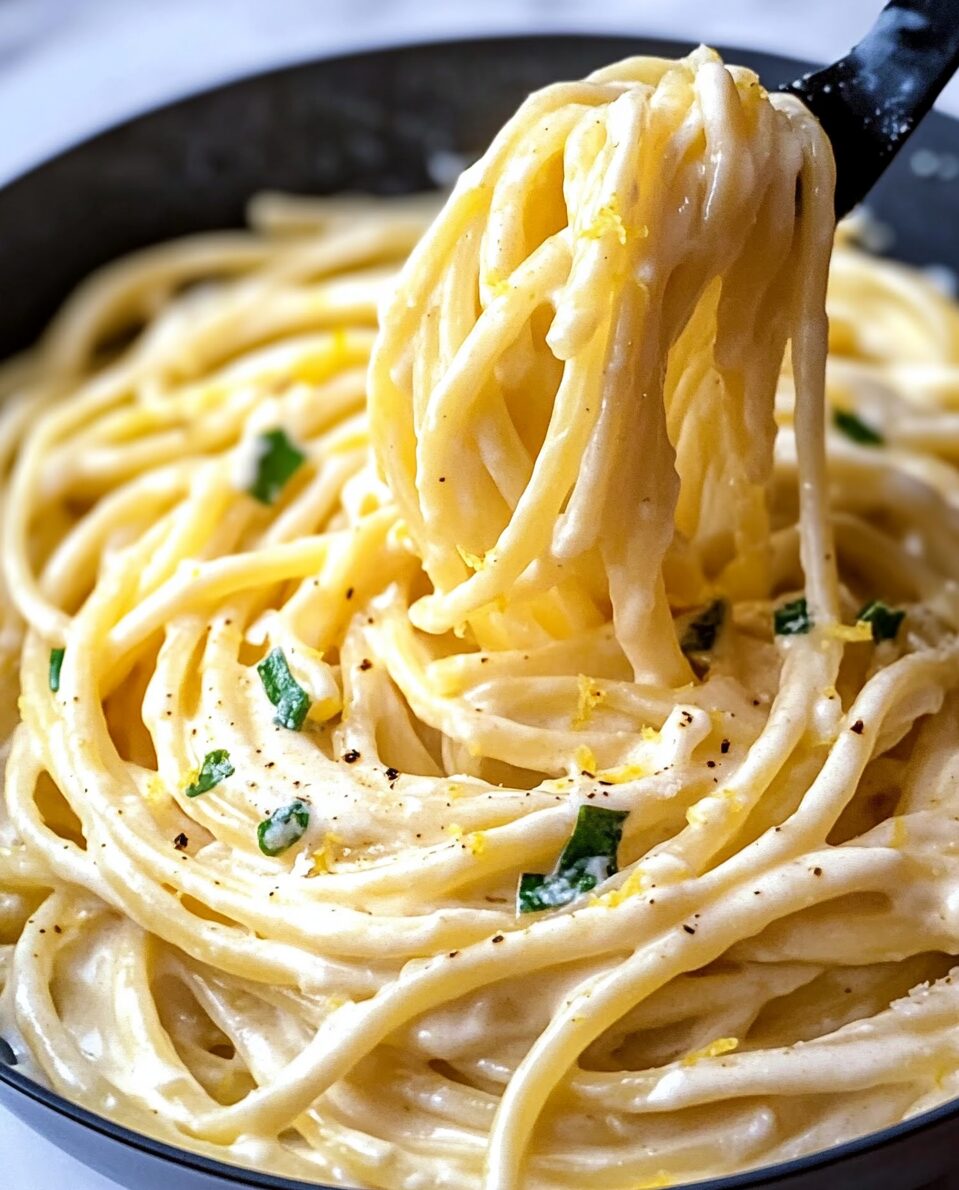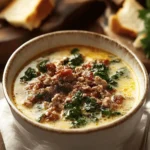Lemon Pasta is a simple yet flavorful dish that showcases the bright, tangy flavors of lemon combined with pasta. This recipe is not only quick to prepare but also offers a refreshing option for any meal, making it perfect for warm weather or when you want something light and satisfying.
Full Recipe
Ingredients:
- 8 oz spaghetti
- 2 lemons (zest and juice)
- 3 tbsp olive oil
- 3 cloves garlic, minced
- 1/2 cup grated Parmesan cheese
- Fresh basil, for garnish
- Salt and pepper to taste
Instructions:
- Cook Pasta: In a large pot, bring salted water to a boil. Add spaghetti and cook according to package instructions until al dente. Reserve 1 cup of pasta water, then drain the rest.
- Sauté Garlic: In a large skillet, heat olive oil over medium heat. Add minced garlic and sauté for 1-2 minutes until fragrant, being careful not to burn it.
- Add Lemon: Stir in lemon zest and juice. Mix well.
- Combine: Add the drained pasta to the skillet, tossing it with the lemon mixture. Gradually add reserved pasta water until desired consistency is reached.
- Finish: Stir in Parmesan cheese and season with salt and pepper. Garnish with fresh basil and serve immediately.
Nutritional Information
Lemon Pasta is often praised for being light yet satisfying. It’s a great option for those looking for a vegetarian meal that’s rich in flavor without being heavy. The use of fresh ingredients ensures a healthy dish that’s packed with vitamins.
Tips and Variations
- Add Vegetables: Incorporate seasonal vegetables such as spinach, asparagus, or cherry tomatoes for added nutrition and color.
- Protein Options: For a heartier dish, consider adding grilled chicken, shrimp, or chickpeas.
- Make It Vegan: Omit Parmesan or substitute with a vegan cheese alternative to make this dish vegan-friendly.
- Herb Variations: Experiment with different herbs like thyme or dill for unique flavor profiles.
Serving Suggestions
Serve Lemon Pasta with a side salad or garlic bread for a complete meal. It pairs well with white wines like Pinot Grigio or Sauvignon Blanc, enhancing the citrusy flavors of the dish.
Historical Context
- Italian Cuisine: Lemon pasta is rooted in Italian culinary traditions, where citrus fruits, particularly lemons, are frequently used in dishes to brighten flavors. The Amalfi Coast in Italy, famous for its lemon groves, has contributed significantly to the popularity of lemon-based dishes.
- Seasonal Cooking: In Italian cooking, using seasonal ingredients is a key principle. Lemons are often associated with spring and summer dishes, reflecting the vibrant flavors of these seasons.
Ingredient Benefits
- Pasta: A source of carbohydrates, pasta provides energy. Whole grain or legume-based pasta can offer additional fiber and protein.
- Lemons: High in vitamin C and antioxidants, lemons support immune health and add freshness to dishes. Their acidity helps balance flavors in rich meals.
- Olive Oil: A staple in Mediterranean diets, olive oil is rich in healthy monounsaturated fats and has anti-inflammatory properties.
- Garlic: Known for its potential health benefits, garlic is believed to have antimicrobial and immune-boosting properties.
- Fresh Herbs: Herbs like basil and parsley not only enhance flavor but also provide vitamins and minerals, contributing to overall health.
- Parmesan Cheese: While adding richness, Parmesan is a good source of protein and calcium.
Variations and Additions
- Creamy Lemon Pasta: For those who prefer a richer sauce, add a splash of heavy cream or cream cheese to the lemon and garlic mixture to create a creamy lemon sauce.
- Nutty Flavor: Incorporate toasted pine nuts or walnuts for a crunchy texture and nutty flavor that complements the lemon.
- Seafood Twist: Add shrimp or scallops for a seafood variation, which pairs beautifully with lemon.
- Spicy Kick: For those who enjoy heat, add red pepper flakes or chopped fresh chili to the sauce.
Preparation Tips
- Zest and Juice: Use both the zest and juice of lemons to maximize flavor. The zest contains essential oils that add intense lemon flavor without acidity.
- Timing: Add the pasta to the sauce just before serving to maintain the freshness of the herbs and the integrity of the pasta.
- Taste as You Go: Adjust the seasoning throughout the cooking process. If the sauce tastes too acidic, balance it with a touch of sugar or honey.
Pairing Suggestions
- Wine Pairings: Light white wines, such as Pinot Grigio, Sauvignon Blanc, or even a dry Prosecco, enhance the flavors of the lemon pasta. For a non-alcoholic option, consider sparkling water with a lemon wedge.
- Side Dishes: Complement the meal with a light arugula salad dressed with a simple vinaigrette, or serve with roasted vegetables to round out the meal.
Related Dishes
- Lemon Orzo Salad: A refreshing salad made with orzo pasta, lemon dressing, and vegetables, perfect for summer picnics.
- Linguine with Clam Sauce: A classic Italian pasta dish featuring linguine tossed in a garlic and white wine clam sauce, often enhanced with lemon.
- Pasta Aglio e Olio: A simple dish made with spaghetti, garlic, olive oil, and a sprinkle of red pepper flakes, sometimes finished with a squeeze of lemon.
- Citrus Risotto: Creamy risotto flavored with lemon and orange zest, providing a refreshing take on the traditional dish.
Nutritional Value
Lemon Pasta can be a nutritious meal option, depending on the ingredients used. Here’s a breakdown of the nutritional components:
- Carbohydrates: The pasta provides a primary source of carbohydrates, essential for energy. Choosing whole grain pasta increases fiber content, which aids digestion.
- Protein: Adding ingredients like Parmesan cheese or a protein source (chicken, shrimp, or chickpeas) can enhance the protein content, contributing to muscle health and satiety.
- Vitamins and Minerals:
- Vitamin C: Lemons are high in vitamin C, which is important for immune function and skin health.
- Calcium: If Parmesan is added, it contributes to calcium intake, promoting bone health.
- Iron: Adding vegetables like spinach or chickpeas boosts the iron content, essential for oxygen transport in the body.
- Healthy Fats: Olive oil is a source of monounsaturated fats, which can support heart health by reducing bad cholesterol levels.
Cooking Techniques
- Sautéing: Sautéing garlic in olive oil is a fundamental technique in Italian cooking. It allows the garlic to infuse the oil with flavor, creating a base for the sauce.
- Emulsifying: When combining pasta with sauce, the goal is to create a cohesive dish. The starchy pasta water helps to emulsify the sauce, creating a silky texture that clings to the pasta.
- Balancing Flavors: The combination of acidity from the lemon and the richness from the olive oil and cheese creates a well-rounded flavor profile. This balance is essential in many Italian dishes.
Cultural Significance
- Mediterranean Diet: Lemon Pasta aligns well with the principles of the Mediterranean diet, which emphasizes whole foods, healthy fats, and fresh produce. This diet has been linked to numerous health benefits, including heart health and longevity.
- Simplicity of Italian Cooking: The essence of Italian cuisine lies in using a few high-quality ingredients to create flavorful dishes. Lemon Pasta exemplifies this philosophy, demonstrating that simplicity can lead to extraordinary flavors.
Additional Ways to Enjoy Lemon Pasta
- Lemon Pasta Salad: Let the lemon pasta cool and toss it with additional vegetables like cherry tomatoes, cucumbers, and bell peppers to create a refreshing pasta salad. Drizzle with olive oil and more lemon juice before serving.
- Lemon Pasta with Grilled Chicken: Serve the lemon pasta alongside grilled chicken breast marinated in lemon juice and herbs for a complete meal.
- Lemon and Spinach Pasta: Add fresh spinach to the pasta during the last minute of cooking for an added nutritional boost and color.
- Lemon Pasta with Pesto: For a unique twist, mix lemon pasta with homemade or store-bought pesto for a herby and citrusy flavor explosion.
- Lemon Pasta Soup: Transform leftover lemon pasta into a comforting soup. Add vegetable or chicken broth, fresh vegetables, and herbs for a hearty meal.
Common Mistakes to Avoid
- Overcooking the Pasta: Cooking pasta beyond al dente can lead to a mushy texture. Keep an eye on the cooking time and taste regularly.
- Not Using Reserved Pasta Water: Forgetting to reserve pasta water can result in a dry dish. This starchy water is essential for achieving the desired sauce consistency.
- Skipping the Zest: Omitting lemon zest reduces the overall flavor of the dish. Always include zest for an extra punch of lemony goodness.
- Overdoing the Lemon: While lemon is the star ingredient, too much can overpower the dish. Start with a moderate amount and adjust according to taste.
Final Thoughts
Lemon Pasta is a delightful dish that brings brightness and flavor to the table. Its versatility allows for endless adaptations, making it suitable for various occasions, whether it’s a quick weeknight dinner or a festive gathering. By incorporating fresh, seasonal ingredients, you can create a meal that is not only delicious but also nourishing.
Conclusion
Lemon Pasta is not just a dish; it’s a celebration of fresh, vibrant ingredients that can be adapted to suit various tastes and dietary needs. Its versatility and ease of preparation make it a beloved choice for home cooks and restaurant menus alike. Whether enjoyed on a weeknight or served at a gathering, Lemon Pasta continues to delight with its bright flavors and comforting qualities.






